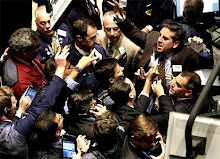Don't get too excited about some recent brighter economic news
IT HAS been a cheerful couple of days for those starved of bright economic news. Hopeful statistics have been trickling in from many parts of the world. On Friday May 29th revised first quarter GDP figures for America showed that the economy there had contracted slightly less than had earlier been reported. In addition durable-goods orders in the country rose by the most in 16 months. In Japan, factory output rose by 5.2% in April, the biggest monthly increase, in percentage terms, in over half a century. And in the first quarter India’s economy grew by a bullish 5.8%, compared with a year before, while South Korea’s industrial production continued to rise in April.
Even in gloomy Europe there are encouraging signs. Poland’s GDP ticked up by 0.8% in the first quarter, as did German private consumption (in the same period) and retail sales also grew, by 0.5%, in April. British consumer confidence remained steady in April, and house prices there rose both in March and May, according to one index.
For optimists, these are all signs that might point towards the beginning of the end of the “Great Recession”. Headline writers, and those who are urging stockmarkets to continue rising, will continue to talk of hopes of recovery. Yet a closer look at the detail of the latest figures suggests that hope springs eternal and will latch on to what it can—even when a more sober analysis would suggest there is a long way to go before recovery sets in.
Optimists make much of statistics that beat analysts’ expectations. But when a particular figure outdoes predictions it may be because those expectations were overly pessimistic, rather than a sign that something fundamental has changed for the better.
What, for instance, is the right reference point on the latest news on India's economy? Doomsters might fret that it has grown at the slowest quarterly pace in several years. Cheerleaders could rejoice that it has expanded slightly faster than most people had expected. Weary of negative news, the latter explanation is a tempting way to make sense of the numbers, but the gloomy view is equally valid.
Consider, too, the figures for consumer confidence in Britain. Although consumer gloom seems to have abated, the reported level of –27 is remarkably low by historical standards. If one takes into account reports that British consumers had been growing a bit more confident in recent months, the latest statistic could suggest a halt to a small rally, which is hardly something to cheer. This example highlights the difficulty of extrapolating from a single month or quarter of data, which can easily be skewed by one-off events such as a national holiday or sudden desperate measures by retailers to offload stock. Discerning whether a more sustained recovery might be under way takes, unsurprisingly, more data.
Thus pessimists, who are unconvinced that the worst is over for the world economy, have much to reinforce their dark mood. One particular concern is that the financial and credit problems at the root of the global recession have not been dealt with satisfactorily. Keiichiro Kobayashi, a Japanese economist, has looked back to Japan’s experience in the late 1990s and argues that unless the banks are fixed, a strong recovery for the world economy is impossible. Some disagree, suggesting that economic output can bounce back even before credit and financial markets are again healthy, if consumers get their wallets open. But even if this argument is compelling in some historical cases, this time it seems that household spending in many economies will remain weak because of high levels of debt.
One man who has made his name in recent years as a doom-monger, Nouriel Roubini, an economist at New York University, recently suggested that recovery from recession was far from imminent, arguing that “it's going to last another six to nine months”. It might not be surprising that he avoids a bullish prediction, but Mr Roubini goes one step further, noting that other economists are still suggesting a “doomsday” scenario, with continuing contraction for a long time to come, and thus even he could be considered as an optimist.
Sunday, May 31, 2009
Subscribe to:
Post Comments (Atom)


No comments:
Post a Comment